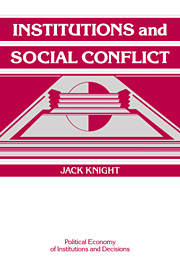Book contents
- Frontmatter
- Contents
- Series editors' preface
- Preface
- CHAPTER 1 INTRODUCTION
- CHAPTER 2 THE PRIMARY IMPORTANCE OF DISTRIBUTIONAL CONFLICT
- CHAPTER 3 INSTITUTIONS AND STRATEGIC CHOICE: INFORMATION, SANCTIONS, AND SOCIAL EXPECTATIONS
- CHAPTER 4 THE SPONTANEOUS EMERGENCE OF SOCIAL INSTITUTIONS: CONTEMPORARY THEORIES OF INSTITUTIONAL CHANGE
- CHAPTER 5 THE SPONTANEOUS EMERGENCE OF SOCIAL INSTITUTIONS: A BARGAINING THEORY OF EMERGENCE AND CHANGE
- CHAPTER 6 STABILITY AND CHANGE: CONFLICTS OVER FORMAL INSTITUTIONS
- CHAPTER 7 CONCLUSION
- Bibliography
- Index
CHAPTER 6 - STABILITY AND CHANGE: CONFLICTS OVER FORMAL INSTITUTIONS
Published online by Cambridge University Press: 16 September 2009
- Frontmatter
- Contents
- Series editors' preface
- Preface
- CHAPTER 1 INTRODUCTION
- CHAPTER 2 THE PRIMARY IMPORTANCE OF DISTRIBUTIONAL CONFLICT
- CHAPTER 3 INSTITUTIONS AND STRATEGIC CHOICE: INFORMATION, SANCTIONS, AND SOCIAL EXPECTATIONS
- CHAPTER 4 THE SPONTANEOUS EMERGENCE OF SOCIAL INSTITUTIONS: CONTEMPORARY THEORIES OF INSTITUTIONAL CHANGE
- CHAPTER 5 THE SPONTANEOUS EMERGENCE OF SOCIAL INSTITUTIONS: A BARGAINING THEORY OF EMERGENCE AND CHANGE
- CHAPTER 6 STABILITY AND CHANGE: CONFLICTS OVER FORMAL INSTITUTIONS
- CHAPTER 7 CONCLUSION
- Bibliography
- Index
Summary
This process of spontaneous emergence produces the informal institutions constituting the foundation of society. By providing information about the anticipated behavior of social actors, these conventions and norms stabilize social expectations and structure social life. Because they are self-enforcing, the efficacy of these rules depends on the extent to which social actors find it in their self-interest to comply with them. There are many circumstances in which self-interest dictates either simple noncompliance or an effort to change the rule. If these circumstances become too pervasive, the stability of the informal institution will be threatened.
Formal institutions are designed and created on this foundation of informal conventions and norms. In some cases, the formal rules are established as a way of stabilizing or changing existing informal rules. In other cases, the rules are created to structure those social interactions that lack an informal institutional framework. The most important of these are the rules created to structure collective decision making. Compliance with formal rules is reinforced by the sanctions of an external-enforcement mechanism. Thus, the creation of formal institutions introduces both law and the state into the structure of social life.
The introduction of the state helps distinguish theories of institutional development and change. Such explanations can be characterized by a primary, if not an exclusive, focus on either formal or informal institutions.
- Type
- Chapter
- Information
- Institutions and Social Conflict , pp. 171 - 208Publisher: Cambridge University PressPrint publication year: 1992



